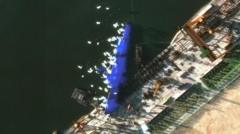North Korea successfully refloated a warship that capsized during a launch attempt, following strong rebukes from leader Kim Jong Un, who characterized the incident as a serious blow to the country’s military dignity. The ship, restored to balance and now docked, signifies ongoing efforts to enhance military capabilities.
North Korea Successfully Refloats Warship Following Failure and Leadership Scrutiny

North Korea Successfully Refloats Warship Following Failure and Leadership Scrutiny
The North Korean regime has managed to refloat a 5,000-tonne destroyer after it tipped over during a launch. Leader Kim Jong Un's harsh response reflects the pressure for military advancement amid international criticism.
North Korea has reportedly managed to refloat a warship that had capsized during a prior launch attempt, eliciting stern condemnation from its leader, Kim Jong Un. According to state-run news agency KCNA, the warship, weighing 5,000 tons, was "safely entered the water vertically" and is now secure at a dock. It is anticipated that full repairs will be completed ahead of an important meeting led by Kim, which is set to convene top officials from the nation's ruling party.
Recent satellite imagery from specialists at 38 North and NK News indicates the vessel was upright at the pier, and then floated in the harbor approximately three hours later. The process of righting the ship, carried out on Thursday, involved manual efforts, with researchers noting the use of tethers and barrage balloons to help balance the destroyer.
Kim Jong Un had previously witnessed the warship's topple during the failed launch, describing the incident as a "criminal act" that significantly harmed the country's dignity. He attributed the failure to "absolute carelessness, irresponsibility and unscientific empiricism." Following his outburst, authorities arrested at least four officials linked to the event, including Ri Hyong-son, a deputy director within the ruling Workers' Party’s Munitions Industry Department. The punishment for these officials remains uncertain, although punitive measures in North Korea often include forced labor or severe penalties.
Experts suggest that Kim's prompt and harsh reaction signals a commitment by Pyongyang to enhance its military prowess. Jihoon Yu from the Korea Institute for Defense Analyses noted that the regime is heavily focused on projecting itself as a formidable military power, with the incident likely intensifying their determination to bolster military capabilities. Michael Madden, a North Korea analyst at the Stimson Center, interprets Kim's stringent response as indicative of the regime's high priority on advancing its naval forces, highlighting that North Korea had unveiled a similar ship shortly before the mishap, describing it as a "breakthrough" for the navy.














